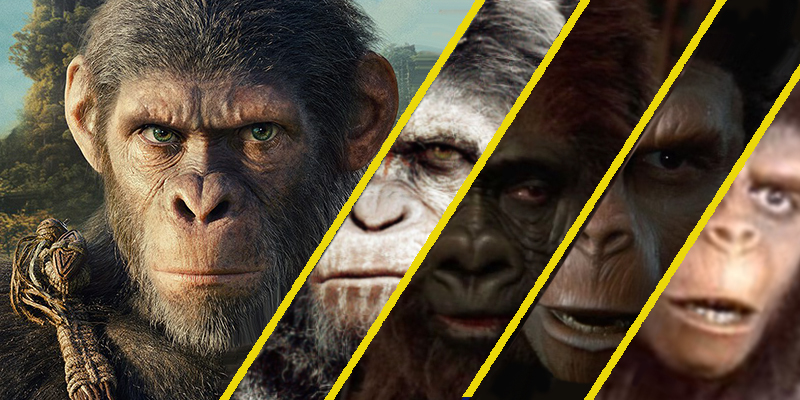The Planet of the Apes series, which has just released its tenth installment with Wes Ball’s new film Kingdom of the Planet of the Apes, is for my money one of the most consistent franchises in cinema history. Every entry has at minimum something worthwhile about it (even the maligned 2001 Tim Burton-directed reboot features stunning makeup and Paul Giamatti as an unscrupulous orangutan merchant). But at their best, the Planet of the Apes films pose profound questions about the nature of civilization, sentience, and man- (or ape-) kind’s capacity for war.
As of this year, the series is fifty-six years old. The first five films, beginning with the original in 1968 (and continuing with 1970’s Beneath the Planet of the Apes, 1971’s Escape from the Planet of the Apes, 1972’s Conquest of the Planet of the Apes, and 1973’s Battle for the Planet of the Apes), form their own distinct continuity, beginning with Charlton Heston’s Taylor, an astronaut, crash-landing on the titular planet. This original run of films tells the story of the birth and death of the planet of the apes in a complex causal loop involving both space and time travel. Then of course there is the aforementioned reboot, the first attempt to reset the series’ knotty continuity.
But Planet of the Apes hit new heights with the second attempt to reset continuity, the new reboot trilogy (confusing, I know) that began with 2011’s Rise of the Planet of the Apes, directed by Rupert Wyatt, and continued with 2014’s Dawn of the Planet of the Apes and 2017’s War for the Planet of the Apes, both directed by Matt Reeves. The trilogy, which ignored the other movies for the most part (save for a few Easter Eggs), focused on Caesar, a hyper-intelligent chimpanzee, played by Andy Serkis in one of the most breathtaking motion-capture performances ever committed to film. Caesar learns about the brutal and inhumane conditions his fellow apes are forced to endure (including medical testing and imprisonment in zoos), and becomes radicalized and leads apekind in a revolution, which dovetails with a global pandemic that wipes out most of the human population and leaves the few remaining cognitively diminished and mute (much like they are in the original film). Over the course of three films, Caesar tries to live up to his moral code and achieve peace in the face of hostile humans and apes who understandably cannot forgive their oppressors.
All this is to say, Kingdom of the Planet of the Apes, the fourth film in this new sub-series within the larger franchise, has a rich, complex, and powerful legacy to live up to, but I am thrilled to report that it does so with gusto, reckoning with said legacy while at the same time staking out new exciting territory for the franchise.
Set “many generations” after War (but in the same continuity), Kingdom centers on Noa, played by Owen Teague, a young chimp who lives with the secluded Eagle Clan (so named for their tradition of raising eagles from hatchlings). The Eagle Clan knows nothing of Caesar or the larger world—young Noa and the rest of his friends are forbidden from venturing beyond the valley at the edge of their village for fear of encountering “Echoes” (their term for the human remnants). Noa’s concerns are parochial and all-too-human—his father, the Master of Birds and leader of their clan, cuts an imposing figure, and Noa clearly lives in his shadow, wrestling with the weight of making his father proud and the responsibility of being heir to the village elder.
But Noa’s world is upended with the sudden intrusion of a human woman (Freya Allan), who brings in her wake a raiding party of apes in service of Proximus Caesar (Kevin Durand). The invaders ruthlessly destroy Noa’s village and capture most of his clan, leaving him for dead.
A harrowing sequence even for new viewers, it is especially troubling for long-time fans to hear a group of murderous apes shout “For Caesar!” as they lay waste to a peaceful village. Proximus, as we will come to learn, has corrupted Caesar’s memory, using it to bolster his own reign. But when Noa sets out on his own to try to find his family and friends, he meets Raka (Peter Macon), a wise orangutan who has also suffered due to Proximus’ raiders, and who has dedicated himself to collecting books and preaching the good word of Caesar and his philosophy of ape solidarity. Raka also tells Noa that Caesar tried to make peace with humans, and so, despite Noa’s mistrust, they allow Freya Allan’s human character, whom they call Nova in a nod to previous movies, to join them as they traverse this strange planet in search of Noa’s lost villagers.
Ball’s film is tremendously exciting, with several extremely tense sequences, but I found myself most struck by the patience and stillness in this early stretch of the film (which also must be credited to the script by Josh Friedman). There is a serenity and decency to Noa’s life in the Eagle Clan (we learn that while it is tradition for the young apes to take eggs from eagles’ nests, it is equally important for them to always leave one behind in each nest for the mother bird), and these scenes have real warmth, taking the time to establish just what Noa is fighting for.
And once Noa, Raka, and their human companion begin their journey, the film gives itself the space to luxuriate in simple acts of bonding and character development amidst the gorgeous location photography. I was frequently reminded of James Cameron’s 2022 film Avatar: The Way of Water (which Josh Friedman also has a story credit on)), and how that film allowed its characters (and by extension the audience) to vibe out for long stretches of the narrative; while Kingdom is the longest film in the Apes series at 145 minutes, I could have easily watched another hour of our three heroes simply getting to know each other over the course of their travels.
Much has been said already of legendary visual effects house Wētā FX and its work in bringing the ape characters in these recent reboot films to life, but Kingdom features possibly their best work yet. Again I was reminded of The Way of Water, the last blockbuster feature that felt like a real breakthrough moment in visual effects. At this point, the line between reality and CGI in these films has become paper-thin—I fully think of the ape characters as living, breathing beings (one shot in particular, a close-up in which Noa looks into the eyepiece of an abandoned high-powered telescope, had me gasping in the theater).
But of course, it must be said that this is not just the work of incredibly talented visual effects artists, but also incredibly talented actors. This franchise has always showcased actors performing through some sort of intermediate medium, whether that was Roddy McDowall and Kim Hunter emoting through heavy prosthetics or Andy Serkis through motion-capture, and in all cases the heart and humanity (for lack of a better term) has always shined through. Kingdom adds to the impressive roster of actors who have convinced me that they are indeed apes. Teague is an engaging and heartfelt lead, who really makes you feel and relate to Noa’s inner conflict, and Durand finds the depth and vulnerability underneath Proximus’ villainy. But a particular standout is Peter Macon as the lovable Raka. Viewers of the reboot trilogy know that secretly the best characters are usually the orangutans, with Karin Konoval’s Maurice, the right-hand to Caesar, being a fan-favorite, and Raka is no exception (seriously, I never thought of orangutans as one of my favorite animals, but these movies have convinced me that that is indeed the case). If you ever have the opportunity, you should watch footage of Planet of the Apes actors without the effects laid over them to see just how transportive their performances are (Wes Ball has stated that he wants to include a entire cut of the film featuring the actors in their mo-cap suits in the special features of the eventual physical release, to which I say: I will be pre-ordering the 4K steelbook as soon as possible, thank you very much). However, this focus on the apes is not to say that the film’s human characters are lacking—Freya Allan’s Nova is compellingly mysterious, with shifting motivations that Allan navigates through wonderfully.
Where Ball’s new film differentiates itself most from the rest of the series is its thematic concerns. In the waves of discourse and analysis surrounding the franchise, much attention is paid to the twist ending of the original film, in which (spoiler alert) it is revealed that the titular planet of the apes is Earth after a presumably human-caused cataclysm (implied to be nuclear warfare, due to the anxieties of the time)—thus proving that mankind’s inevitable fate is self-destruction.
But to me, the real tragedy of the planet of the apes is that the apes have failed to create a better, more humane (again, for lack of a better term) society, instead replicating our violence, our prejudices, and our rigid and oppressive class system. The apes are frequently the heroes in the movies set before the time of the first movie, but we know from the beginning of the series that they are doomed to repeat our mistakes and become villains themselves. Kingdom is dramatizing that shift in the apes’ civilization in a profound way. Proximus Caesar is fascinated with Roman history and has modeled his leadership style based on what he has learned about humans. The aspects of humanity he admires the most are particularly telling—he explains to Noa that, among other things, they were capable of “leveling mountains.” He specifically wants to emulate their destructive nature. We have seen apes be villainous before, but in Proximus, we start to understand how they will become more human.
Kingdom is additionally fascinating in its exploration of the intersection between mythology and history. By situating the events of the series we know so well in the distant past of this new film, we have the clearest perspective on how this world has been shaped by those events, in ways that the characters themselves don’t even fully understand.
Recent trends in franchise filmmaking involve validating the audience’s fandom by imbuing the original entries with an overwhelming mythological weight, but Kingdom is in conversation with Rise/Dawn/War in a productive and interesting way, allowing Proximus and Raka to represent two contradictory interpretations of that history, with Raka in particular demonstrating how a little bit of history can be corrupted and weaponized for nefarious purposes. And for a long-time fan, it makes those previous movies feel important in a way that does not feel overblown.
While it stands on its own as a thrilling, emotional narrative, Kingdom is clearly setting up a new ongoing story within the larger series, ending on several tantalizing questions (Ball has stated that they have plans for at least two more chapters). I can say that based on this installment, I am excited to see where the filmmakers take things going forward. I claimed at the beginning of this review that Planet of the Apes is one of the most consistent franchises in cinema history, and that title has not been lost. This venerable saga is in good hands.

















